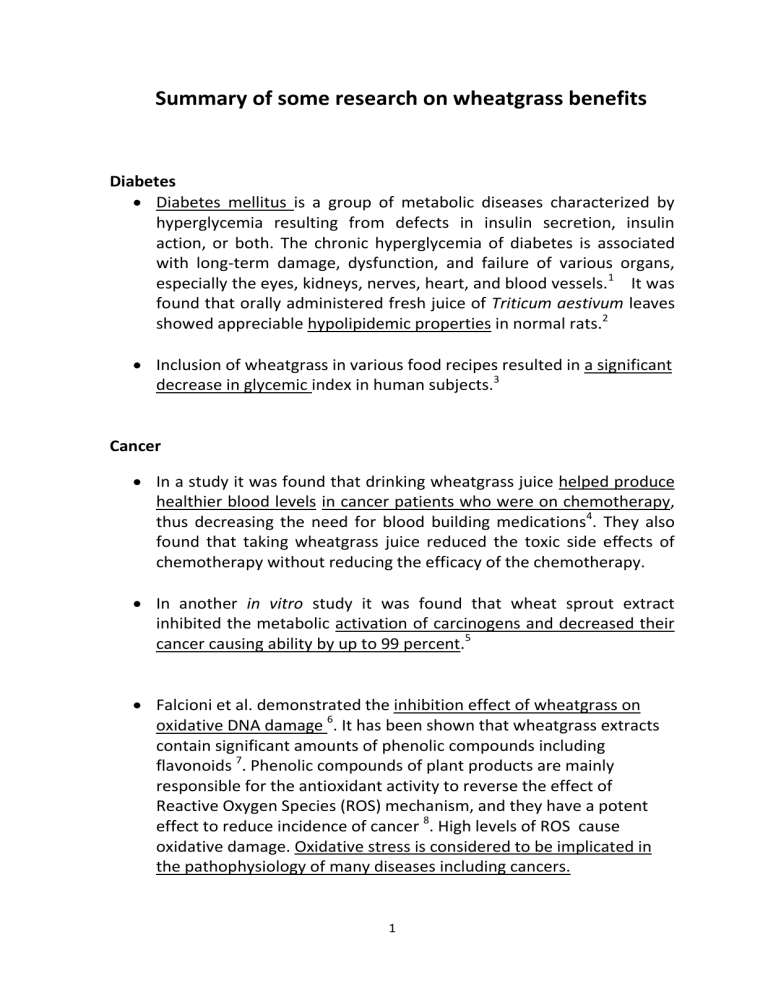
Summary of some research on wheatgrass benefits
Diabetes
Diabetes mellitus is a group of metabolic diseases characterized by
hyperglycemia resulting from defects in insulin secretion, insulin
action, or both. The chronic hyperglycemia of diabetes is associated
with long-term damage, dysfunction, and failure of various organs,
especially the eyes, kidneys, nerves, heart, and blood vessels.1 It was
found that orally administered fresh juice of Triticum aestivum leaves
showed appreciable hypolipidemic properties in normal rats.2
Inclusion of wheatgrass in various food recipes resulted in a significant
decrease in glycemic index in human subjects.3
Cancer
In a study it was found that drinking wheatgrass juice helped produce
healthier blood levels in cancer patients who were on chemotherapy,
thus decreasing the need for blood building medications4. They also
found that taking wheatgrass juice reduced the toxic side effects of
chemotherapy without reducing the efficacy of the chemotherapy.
In another in vitro study it was found that wheat sprout extract
inhibited the metabolic activation of carcinogens and decreased their
cancer causing ability by up to 99 percent.5
Falcioni et al. demonstrated the inhibition effect of wheatgrass on
oxidative DNA damage 6. It has been shown that wheatgrass extracts
contain significant amounts of phenolic compounds including
flavonoids 7. Phenolic compounds of plant products are mainly
responsible for the antioxidant activity to reverse the effect of
Reactive Oxygen Species (ROS) mechanism, and they have a potent
effect to reduce incidence of cancer 8. High levels of ROS cause
oxidative damage. Oxidative stress is considered to be implicated in
the pathophysiology of many diseases including cancers.
1
In another study the effects and oxidant/antioxidant status of
aqueous and ethanol extracts of wheatgrass were tested in human
chronic myeloid leukemia CML (K562) cell line. Conclusion:
Wheatgrass extract has an antioxidant activity, it inhibits proliferation
of leukemia cells, and induces apoptosis; thus, this finding may
represent a novel therapeutic approach for the treatment of this type
of leukemia 9.
Blood disease
Wheatgrass juice has the potential to lower blood transfusion
requirements in β-thalassemia (blood disease) major. A beneficial
effect of wheatgrass was defined as decrease in the requirement of
packed red cell by 25% or more.10 Wheatgrass juice is also useful in
adjuvant therapy in hemolytic anemia8.
Aqueous extracts of wheatgrass are good sources of antioxidants.
Significant antioxidant activity was demonstrated by in vitro studies.11
Ulcerative colitis / Inflammatory Bowel Disease
In a Randomized, double-blind, placebo-controlled study they found
that wheatgrass juice improved the symptoms and bleeding in
Irritable Bowl Disease patients12. Barley grass proved to improve
bleeding and nocturnal diarrhoea 13.
Obesity, anxiety and depression
Magnesium, abundant in wheatgrass juice, is an essential mineral,
which has been linked in medical research4 to prevention of stroke,
obesity and improvement of memory. Scientists have also found that
lack of magnesium can produce symptoms of anxiety and depression
including insomnia14.
REFERENCES:
1. American diabetes association. Diagnosis and classification of diabetes
mellitus. Diabetes Care 2005;28(1):S37-S42.
2
2. Kothari S, Jain AK, Mehta SC, Tonpay SD. Effect of fresh Triticum
aestivum grass juice on lipid profile of normal rats. Indian J Pharmacol
2008;40(5):235-6.
3. Uma I, Minal S, Swati D, Uliyar VM. Glycemic and lipemic response of
wheat grass incorporated recipes. Journal of Herbal Medicine and
Toxicology 2010;4(1):161-4.
4. Bar-Sela G, Tsalic M, Fried G, Goldberg H. Wheatgrass juice may
improve hematological toxicity related to chemotherapy in breast
cancer patients: A pilot study. Nutr Cancer 2007;58(1):43-8.
5. Lai CN, Dabney B, Shaw C. Inhibition of in vitro metabolic activation of
carcinogens by wheat sprout extracts. Nutr Cancer 1978;1(1):27-30.
6. Falcioni G, Fedeli D, Tiano L, Calzuola I, Mancinelli L, Marsili V,
Gianfranceschi G. Antioxidant activity of wheat sprouts extracts in
vitro: Inhibition of DNA oxidative damage. J Food Sci 2002; 67: 291822.
7. Calzuola I, Marsili V, Gianfranceschi GL. Synthesis of antioxidants in
wheat sprouts. J. Agric Food Chem 2004; 52:
5201-6.
8 Swati P, Sushma D, Indira R, Alka G, Mamta D. Multitude potential of
wheatgrass juice (Green Blood): An overview. Chronicles of young
scientists 2010;1(2):23-8.
9. Oya Sena Aydos, Aslıhan Avci, Tülin Özkan, Aynur Karadag, Ebru
Gürleyik, Buket Altinok, Asuman Sunguroglu. Antiproliferative,
apoptotic and antioxidant activities of wheatgrass (Triticum aestivum
L.) extract on CML (K562) cell line. Turk J Med Sci
2011; 41 (4): 657-663
10 Marwaha RK, Bansal D, Kaur S, Trehan A. Wheatgrass juice reduces
transfusion requirement in patients with thalassemia major: A pilot
study. Indian Pediatr 2004;41(7):716-20.
11. Kulkarni SD, Tilak JC, Acharya R, Rajurkar NS, Devasagayam TP, Reddy
AV. Evaluation of the antioxidant activity of wheatgrass (Triticum
3
aestivum L.) as a function of growth under different conditions.
Phytother Res 2006;20(3):218-27.
12 . Ben-Arye E, Goldin E, Wengrower D, Stamper A, Kohn R, Berry
E. Wheatgrass juice in the treatment of active distal ulcerative colitis:
A randomized double-blind placebo-controlled trial. Scand J
Gastroenterol 2002;37(4):444-9.
13. Kanauchi O, Mitsuyama K, Homma T, et al. Treatment of ulcerative
colitis patients by long-term administration of germinated barley
foodstuff: multi-center open trial. Int J Mol Med 2003; 12: 701–4.
14. The Magnesium Miracle, Carolyn Dean, 2007 Ballantine Books.
4












